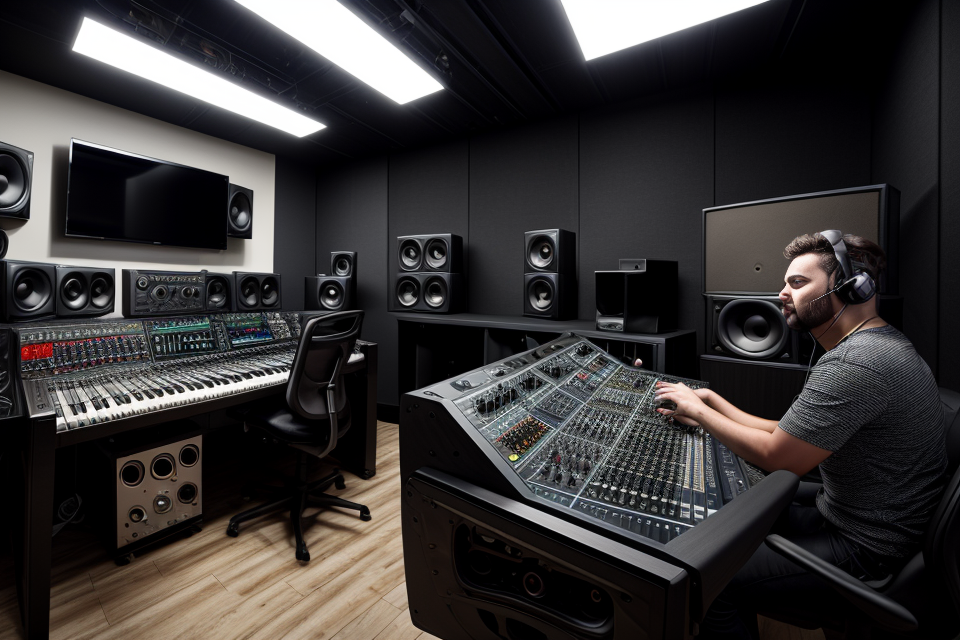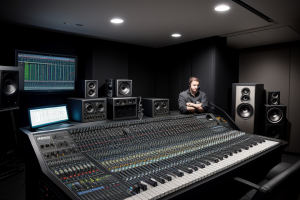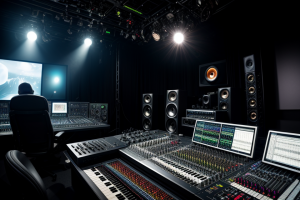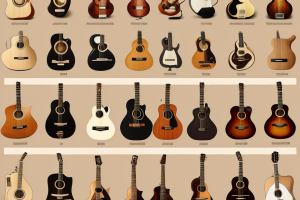
In the fast-paced and ever-evolving world of music, the role of a sound engineer is more crucial than ever. From live concerts to studio recordings, these professionals play a vital role in shaping the sound that we hear. But, are sound engineers in high demand? In this article, we’ll explore the current state of the music industry and examine the role of sound engineers in it. We’ll look at the various types of sound engineering careers available, the skills and qualifications required, and the demand for these professionals in the modern music industry. So, if you’re interested in a career in sound engineering, or just curious about the role of sound engineers in today’s music scene, read on!
The Importance of Sound Engineering in the Music Industry
The Role of Sound Engineers in Music Production
In the fast-paced world of music production, sound engineers play a crucial role in shaping the final product that listeners hear. They are responsible for capturing, enhancing, and manipulating the sound of musical instruments and vocals to create the desired sonic landscape. Here are some of the key tasks that sound engineers perform during the music production process:
- Microphone Techniques: Sound engineers are responsible for selecting and placing microphones in the right positions to capture the best possible sound from musical instruments and vocals. They need to understand the nuances of different microphone types and their frequency responses to achieve the desired tonal balance.
- Signal Processing: Sound engineers use a variety of signal processing techniques to enhance the recorded sound. This includes equalization, compression, reverb, and delay, among others. They need to have a deep understanding of how these processes work and how to use them creatively to achieve the desired sonic effect.
- Mixing and Mastering: Sound engineers are responsible for mixing and mastering the recorded tracks to create a cohesive and balanced final product. They need to have a keen ear for balancing levels, panning, and stereo imaging to create a professional-sounding mix. They also need to be skilled in mastering, which involves making overall adjustments to the volume, EQ, and stereo image to prepare the track for release.
- Troubleshooting and Problem Solving: Sound engineers need to be able to troubleshoot and solve problems quickly and efficiently. This includes dealing with technical issues such as equipment failure, noise pollution, and other challenges that may arise during the recording process.
Overall, the role of sound engineers in music production is critical to the final product. They are responsible for capturing and enhancing the sound of musical instruments and vocals, as well as creating a balanced and cohesive mix. Their technical expertise and creative skills are essential to the success of any music production project.
The Growing Importance of Sound Quality in the Digital Age
- Advancements in digital technology have led to an increased demand for high-quality sound in the music industry.
- The widespread use of streaming platforms and digital audio devices has made sound quality a crucial factor in the listener’s experience.
- Consumers expect a clear and immersive listening experience that rivals that of a live performance.
- Sound engineers play a critical role in achieving this level of audio quality.
- The proliferation of home recording studios has also led to an increased emphasis on sound quality.
- With the rise of affordable and accessible recording technology, more artists are producing their own music and relying on sound engineers to help them achieve a professional sound.
- This has created a need for sound engineers who can work with a diverse range of artists and genres, from indie musicians to established record labels.
- Additionally, the use of social media as a promotional tool has led to an increased focus on sound quality in music videos and live performances.
- High-quality audio is essential for creating visually engaging content that showcases an artist’s talent and attracts new fans.
- Sound engineers are essential in ensuring that music videos and live performances have clear and well-mixed audio that enhances the overall viewing experience.
- In conclusion, the growing importance of sound quality in the digital age has led to an increased demand for skilled sound engineers in the music industry. As technology continues to evolve, the role of the sound engineer will remain critical in ensuring that music is heard in the best possible quality.
- The widespread use of streaming platforms and digital audio devices has made sound quality a crucial factor in the listener’s experience.
Factors Influencing the Demand for Sound Engineers
The Expansion of the Music Industry
- The music industry has experienced significant growth in recent years, with the rise of digital platforms and the globalization of music consumption.
- This expansion has led to an increased demand for sound engineers, as artists and record labels require professionals to produce, record, and mix their music.
- The growth of live music events, including concerts and festivals, has also contributed to the demand for sound engineers, as they are responsible for the technical aspects of sound production and reinforcement.
- The industry’s reliance on technology has further fueled the demand for sound engineers with expertise in digital audio workstations (DAWs), plugins, and other software tools.
- As the music industry continues to evolve, the demand for skilled sound engineers is likely to remain strong, with opportunities for growth and specialization in various subfields, such as film scoring, game audio, and immersive audio formats like Dolby Atmos.
The Rise of Live Music Events and Concerts
In recent years, the live music industry has experienced a significant surge in popularity, leading to an increased demand for sound engineers. The rise of live music events and concerts can be attributed to several factors, including:
- Growing interest in live entertainment: With the rise of social media platforms and the increasing accessibility of information, there has been a growing interest in live entertainment. People are now more interested in attending live events, which has led to an increase in the number of music concerts and festivals.
- Expansion of the music industry: The music industry has expanded globally, and this has led to an increase in the number of live music events. Artists from different parts of the world are now able to perform in front of larger audiences, leading to a greater demand for sound engineers who can manage the audio needs of these events.
- Technological advancements: The advancements in technology have made it easier for musicians to produce and record their music. This has led to an increase in the number of live music events, as artists can now produce and record their music more easily. Additionally, technological advancements have made it easier for sound engineers to manage the audio needs of live events, leading to an increased demand for their services.
- The role of social media: Social media has played a significant role in the rise of live music events. Artists can now use social media to promote their events, which has led to an increase in attendance. Additionally, social media has made it easier for people to discover new music and artists, leading to an increase in the number of live music events.
Overall, the rise of live music events and concerts has led to an increased demand for sound engineers in the modern music industry. As the popularity of live entertainment continues to grow, it is likely that the demand for sound engineers will continue to rise as well.
The Growing Demand for Audio Post-Production Services
In the modern music industry, there has been a significant increase in the demand for audio post-production services. This demand is fueled by the growing trend of streaming and the increasing complexity of audio production. Sound engineers play a crucial role in audio post-production, and their skills are in high demand.
One of the main reasons for the growing demand for audio post-production services is the increasing popularity of streaming platforms. With the rise of streaming, the way people consume music has changed dramatically. Listeners now expect high-quality audio that is tailored to their specific preferences. Sound engineers are responsible for ensuring that the audio meets these expectations, and their skills are in high demand as a result.
Another factor contributing to the growing demand for audio post-production services is the increasing complexity of audio production. With the advent of digital technology, it is now possible to create highly sophisticated audio productions. This has led to an increase in the number of audio tracks used in productions, making the post-production process more complex. Sound engineers are required to have a deep understanding of the latest audio technology and be able to use it to create high-quality productions.
Furthermore, the demand for sound engineers is not limited to the music industry. Sound engineers are also in high demand in the film and television industries, where their skills are used to create immersive audio experiences for viewers. As the demand for high-quality audio continues to grow, it is likely that the demand for sound engineers will continue to increase as well.
In conclusion, the growing demand for audio post-production services is a significant factor influencing the demand for sound engineers in the modern music industry. As the popularity of streaming platforms continues to grow and the complexity of audio production increases, the demand for skilled sound engineers is likely to increase as well.
The Skills and Qualifications of a Successful Sound Engineer
Technical Skills Required for Sound Engineering
In the modern music industry, sound engineers play a crucial role in the production of high-quality music recordings. To be successful in this field, sound engineers must possess a wide range of technical skills that enable them to operate the complex equipment and software used in the recording process.
Some of the technical skills required for sound engineering include:
- Proficiency in digital audio workstations (DAWs): A sound engineer must be proficient in using digital audio workstations such as Pro Tools, Logic Pro, and Ableton Live. These software programs are used to record, edit, and mix music tracks, and proficiency in them is essential for a sound engineer to produce professional-sounding recordings.
- Knowledge of audio hardware: Sound engineers must have a good understanding of audio hardware such as microphones, preamps, compressors, and equalizers. They must know how to properly set up and use this equipment to capture and manipulate sound.
- Expertise in signal flow and routing: A sound engineer must understand how to route audio signals from one piece of equipment to another, and how to manage multiple tracks of audio in a recording session. This requires a deep understanding of signal flow and routing principles.
- Acoustic theory and room treatment: Sound engineers must have a good understanding of acoustic theory and how to use room treatment techniques to improve the sound of a recording space. This includes knowledge of how to use reflectors, diffusers, and bass traps to control the acoustic environment.
- Audio processing and effects: A sound engineer must be proficient in using audio processing software such as compression, reverb, and delay. They must know how to use these effects to enhance the sound of a recording and make it more appealing to listeners.
In addition to these technical skills, a successful sound engineer must also possess strong communication and interpersonal skills, as they often work closely with musicians, producers, and other members of a recording team. They must be able to communicate effectively and work collaboratively to achieve the desired sound for a project.
Importance of Continuous Learning and Adaptation in the Field
A sound engineer’s career in the music industry is not static. The industry is constantly evolving, and thus, the role of a sound engineer must also evolve. Continuous learning and adaptation are essential to remaining relevant and competitive in the field. Here are some reasons why continuous learning and adaptation are crucial for a successful sound engineer:
- New technologies and techniques: The music industry is constantly introducing new technologies and techniques for recording, mixing, and mastering music. To stay up-to-date with the latest trends, a sound engineer must be continuously learning and adapting to new tools and methods.
- Changing music styles: Different music genres require different recording techniques, and thus, a sound engineer must be familiar with various recording styles. By continuously learning and adapting to new music styles, a sound engineer can better serve the needs of artists and producers.
- Artistic collaboration: Sound engineers often work closely with artists and producers to achieve their desired sound. Continuous learning and adaptation can help a sound engineer better understand the artistic vision of their clients and deliver the desired results.
- Business skills: In addition to technical skills, sound engineers must also possess business skills to manage their careers effectively. This includes knowledge of contracts, rates, and marketing strategies. Continuous learning and adaptation can help a sound engineer navigate the business side of the industry successfully.
In conclusion, continuous learning and adaptation are crucial for a successful sound engineer in the modern music industry. To remain competitive and relevant, sound engineers must keep up with the latest technologies, techniques, and music styles while also developing their business skills.
The Role of Certifications and Educational Backgrounds
A sound engineer is a crucial member of the music industry who plays a vital role in recording, mixing, and mastering the final output of a song. In order to become a successful sound engineer, there are certain skills and qualifications that are required. In this section, we will discuss the role of certifications and educational backgrounds in becoming a successful sound engineer.
Certifications
Certifications are an important aspect of a sound engineer’s career. They demonstrate that the individual has acquired a certain level of knowledge and expertise in the field. There are several certifications available for sound engineers, including:
- Pro Tools Certification: Pro Tools is a digital audio workstation (DAW) used by many sound engineers in the music industry. Obtaining a Pro Tools certification demonstrates that the individual has a solid understanding of how to use the software effectively.
- Audio Engineering Society (AES) Certification: The AES is a professional organization that focuses on audio engineering. They offer several certifications that cover different aspects of audio engineering, including live sound, recording, and broadcasting.
- Live Sound Certification: This certification is offered by the Event Production and Management Program at UC Santa Barbara. It covers the technical aspects of live sound production, including audio equipment setup, sound reinforcement, and signal flow.
Educational Backgrounds
An educational background in audio engineering, music production, or a related field is often preferred by employers in the music industry. A degree or diploma from a reputable institution can demonstrate that the individual has acquired a solid foundation in the principles of audio engineering and music production. Some of the best schools for audio engineering include:
- Berklee College of Music: Located in Boston, Massachusetts, Berklee College of Music is one of the most prestigious music schools in the world. They offer a Bachelor of Music in Music Production and Engineering, which covers the technical and creative aspects of music production.
- University of Miami: The University of Miami in Coral Gables, Florida, offers a Bachelor of Music in Music Engineering Technology. This program covers the technical aspects of audio engineering, including digital audio workstations, sound reinforcement, and music production.
- The Recording Workshop: Located in Chillicothe, Ohio, The Recording Workshop offers a one-year program in audio engineering. This program covers the technical aspects of audio engineering, including microphone techniques, mixing, and mastering.
In conclusion, certifications and educational backgrounds play a crucial role in becoming a successful sound engineer in the modern music industry. Obtaining certifications and pursuing a degree or diploma from a reputable institution can demonstrate to employers that the individual has acquired the necessary knowledge and skills to succeed in the field.
Career Opportunities and Job Markets for Sound Engineers
Traditional Studio Settings
Traditional studio settings refer to the classic recording studios where sound engineers are primarily responsible for capturing, editing, and mixing soundtracks for various music projects. These studios have been a staple in the music industry for decades and continue to play a significant role in shaping the sound of modern music.
Sound engineers working in traditional studio settings have a diverse range of responsibilities, including:
- Setting up and maintaining audio equipment such as microphones, mixing boards, and audio interfaces
- Choosing the appropriate microphones and placement techniques to capture the desired sound
- Recording instruments and vocals with high-quality audio and minimal noise
- Editing and manipulating recorded tracks to enhance their sound and remove any unwanted elements
- Mixing multiple tracks together to create a cohesive and balanced final mix
- Mastering the final mix to optimize it for various playback formats such as CDs, streaming platforms, and live performances
Traditional studio settings require sound engineers to have a deep understanding of audio technology, music theory, and creative artistry. They must be able to work collaboratively with musicians, producers, and other members of the production team while also being able to work independently to achieve the desired sound.
In recent years, the demand for sound engineers in traditional studio settings has evolved alongside the changing landscape of the music industry. As digital technology has become more prevalent, many traditional recording studios have closed, and others have transitioned to offering hybrid services that combine traditional studio work with remote recording and editing.
Despite these changes, there remains a strong demand for skilled sound engineers in traditional studio settings. The ability to create high-quality audio recordings is still a critical aspect of the music production process, and talented sound engineers are highly sought after by record labels, production companies, and independent musicians alike.
Live Events and Concerts
The demand for sound engineers in the live events and concert industry has been steadily increasing in recent years. Live events and concerts have become a significant source of revenue for the music industry, and the demand for skilled sound engineers has followed suit. Sound engineers are responsible for the technical aspects of live events, including sound mixing, sound design, and audio production.
In live events and concerts, sound engineers work closely with musicians, event organizers, and other production teams to ensure that the audio quality is top-notch. They are responsible for setting up and operating sound equipment, including microphones, speakers, and sound boards. Sound engineers must also be familiar with various audio software and technologies, such as digital audio workstations (DAWs) and audio processing tools.
The role of a sound engineer in live events and concerts is crucial, as they are responsible for creating an immersive audio experience for the audience. Sound engineers must have a keen ear for sound quality and be able to adjust sound levels and mixes in real-time to ensure that the music sounds its best.
One of the biggest challenges that sound engineers in live events and concerts face is managing the complex logistics of audio production. This includes coordinating with multiple production teams, such as lighting and stage design, to ensure that all aspects of the event are working together seamlessly.
Overall, the demand for sound engineers in the live events and concert industry is expected to continue to grow in the coming years. As the music industry becomes more competitive, the role of sound engineers in creating an immersive audio experience for audiences will become increasingly important.
Film and Television Industry
The film and television industry is one of the major job markets for sound engineers. This industry requires sound engineers to create, record, and edit sound effects and music for movies, TV shows, and other visual media. Sound engineers in this industry work closely with directors, producers, and other creative professionals to ensure that the audio elements of a production are of the highest quality.
Sound engineers in the film and television industry may work on a variety of projects, ranging from small independent films to large-budget blockbusters. They may be responsible for recording dialogue, creating sound effects, and editing and mixing audio tracks. In addition, they may work on post-production tasks such as adding music and sound effects to visual media, and ensuring that the audio elements of a production are synchronized with the visual elements.
One of the challenges of working in the film and television industry as a sound engineer is the fast-paced nature of production schedules. Sound engineers may be required to work long hours and weekends to meet deadlines, and may need to be flexible in their scheduling to accommodate the needs of the production. However, the demand for skilled sound engineers in this industry is high, and there are many opportunities for career growth and advancement.
Overall, the film and television industry is a key job market for sound engineers, offering opportunities for creative professionals to work on a variety of projects and collaborate with other creative professionals in the industry.
Independent Freelance Work
Sound engineers are in high demand in the modern music industry, and one of the most attractive options for those looking to work in this field is independent freelance work. Freelance work allows sound engineers to work on a project-by-project basis, which can be a great way to build up a diverse portfolio of work and gain experience in a variety of different settings.
Freelance work also provides sound engineers with the freedom to set their own schedules and work on projects that they are passionate about. This can be a great option for those who want to maintain a work-life balance while still pursuing their career goals.
In addition to the flexibility and freedom that freelance work offers, it can also provide sound engineers with the opportunity to work with some of the biggest names in the music industry. From recording studios to live events, there are a wide range of opportunities for sound engineers to work on high-profile projects and gain valuable experience.
However, it’s important to note that freelance work can also be unpredictable and may not provide the same level of job security as a full-time position. It’s important for sound engineers to carefully consider their financial situation and the stability of their work before committing to a freelance career path.
Overall, independent freelance work can be a great option for sound engineers looking to build up their portfolio and gain experience in a variety of different settings. With the right preparation and planning, it can be a rewarding and fulfilling career path for those looking to work in the modern music industry.
Challenges and Limitations in the Sound Engineering Field
Balancing Artistic Vision with Technical Constraints
In the fast-paced and competitive music industry, sound engineers are often faced with the challenge of balancing the artistic vision of the artist with the technical constraints of the recording process. This delicate balance requires a deep understanding of both the creative and technical aspects of music production.
One of the primary challenges for sound engineers is to capture the unique sound and feel of a performance while maintaining the technical quality of the recording. This requires a thorough understanding of the various elements that contribute to the overall sound of a recording, such as microphone placement, signal flow, and equipment selection.
In addition to technical considerations, sound engineers must also navigate the complex and often conflicting artistic visions of the artists they work with. This requires a high level of communication and collaboration skills, as well as the ability to interpret and execute the artist’s creative vision while maintaining technical integrity.
Moreover, the rapid advancement of technology in the music industry has introduced new challenges for sound engineers. The proliferation of digital audio workstations (DAWs) and software plugins has given rise to an array of new tools and techniques for music production, which can be both exciting and overwhelming for sound engineers.
As a result, sound engineers must constantly stay up-to-date with the latest technology and techniques in order to remain competitive and relevant in the industry. This requires a commitment to ongoing learning and professional development, as well as a willingness to adapt to new technologies and approaches.
Overall, balancing artistic vision with technical constraints is a crucial aspect of sound engineering in the modern music industry. It requires a unique combination of technical expertise, creative intuition, and effective communication skills, as well as a commitment to ongoing learning and professional development.
Health and Safety Concerns in Live Events and Touring
The role of a sound engineer in live events and touring is critical, but it comes with significant health and safety concerns. Sound engineers often work long hours, sometimes under extreme conditions, and are exposed to high levels of noise and stress. In addition, the COVID-19 pandemic has created new challenges for sound engineers, who must adhere to strict health and safety protocols to prevent the spread of the virus.
Noise-Induced Hearing Loss
One of the most significant health risks faced by sound engineers is noise-induced hearing loss. Prolonged exposure to loud music and sound can cause permanent damage to the ears, leading to hearing loss and tinnitus. This risk is particularly high during live events and touring, where sound engineers are often exposed to extremely loud volumes for extended periods.
Physical Strain and Injury
Live events and touring can be physically demanding, and sound engineers often have to lift heavy equipment, stand for long periods, and work in cramped spaces. This can lead to physical strain and injury, such as back pain, neck pain, and muscle strain. In addition, the pressure to set up and tear down equipment quickly can lead to accidents and injuries.
Mental Health and Stress
Sound engineers often work in high-pressure environments, where mistakes can have significant consequences. This can lead to stress, anxiety, and mental health issues, such as depression and burnout. In addition, the long hours and irregular schedules associated with live events and touring can disrupt sleep patterns and personal relationships, further exacerbating mental health issues.
COVID-19 Protocols
The COVID-19 pandemic has created new challenges for sound engineers, who must adhere to strict health and safety protocols to prevent the spread of the virus. This includes wearing masks, social distancing, and regular testing, which can be challenging in the close-knit environment of live events and touring. In addition, the uncertainty and unpredictability of the pandemic have created additional stress and anxiety for sound engineers.
Overall, the health and safety concerns faced by sound engineers in live events and touring are significant and cannot be ignored. It is essential for the music industry to prioritize the well-being of its workers and provide appropriate support and resources to mitigate these risks.
Adapting to New Technologies and Industry Standards
The field of sound engineering is constantly evolving, and the demand for sound engineers who can adapt to new technologies and industry standards is at an all-time high. Sound engineers are expected to have a deep understanding of the latest technologies and tools used in the music industry, such as digital audio workstations (DAWs), virtual instruments, and music production software.
One of the biggest challenges facing sound engineers today is the rapid pace of technological change. New technologies and software are being developed all the time, and sound engineers must keep up with these changes in order to remain relevant and competitive in the industry. This requires a significant investment of time and resources, as well as a willingness to continuously learn and adapt to new technologies.
Another challenge facing sound engineers is the need to stay up-to-date with industry standards and best practices. The music industry is highly competitive, and there is a constant pressure to produce high-quality recordings that meet the expectations of record labels, artists, and fans. This requires sound engineers to have a deep understanding of industry standards and best practices, as well as the ability to adapt to new techniques and approaches as needed.
Despite these challenges, the demand for sound engineers who can adapt to new technologies and industry standards remains high. In fact, many music industry professionals believe that the ability to adapt and stay up-to-date with the latest technologies and trends is essential for success in the field. As a result, sound engineers who are able to stay current with the latest technologies and industry standards are highly sought after by record labels, studios, and other music industry professionals.
The Future of Sound Engineering and Its Continued Relevance
The Impact of Emerging Technologies on the Field
The field of sound engineering is constantly evolving, and emerging technologies are having a significant impact on the industry. As new technologies are developed, sound engineers must adapt and learn new skills to stay relevant. Some of the key emerging technologies that are affecting the field of sound engineering include:
- Virtual and Augmented Reality: As virtual and augmented reality technology becomes more prevalent, sound engineers must learn how to create immersive audio experiences for these platforms. This requires a deep understanding of 3D audio and spatial sound, as well as the ability to work with new software and hardware tools.
- Artificial Intelligence and Machine Learning: AI and machine learning are being used to automate many aspects of the sound engineering process, from mixing and mastering to noise reduction and vocal processing. Sound engineers must stay up-to-date with these technologies in order to remain competitive and to create the best possible sound quality.
- Streaming Services: The rise of streaming services has had a significant impact on the music industry, and sound engineers must now focus on creating mixes that sound good on a wide range of devices, from smartphones to home theaters. This requires a deep understanding of loudness normalization, compression, and EQ, as well as the ability to work with a variety of digital audio formats.
- Immersive Audio Formats: Immersive audio formats like Dolby Atmos and Ambisonic are becoming more popular, and sound engineers must learn how to create and mix audio content for these formats. This requires a deep understanding of spatial audio and 3D sound, as well as the ability to work with new software and hardware tools.
Overall, the impact of emerging technologies on the field of sound engineering is significant, and sound engineers must be willing to adapt and learn new skills in order to remain relevant and competitive in the industry.
The Importance of Sound Engineering in Virtual and Augmented Reality
The modern music industry has witnessed a significant shift towards virtual and augmented reality (VR/AR) experiences, leading to an increased demand for sound engineers who specialize in this area. These immersive technologies rely heavily on high-quality audio to provide an authentic and engaging experience for users. Sound engineers play a crucial role in designing, creating, and implementing audio elements within VR/AR environments.
Sound engineering in VR/AR encompasses a wide range of tasks, including:
- Sound Design: Developing original audio content that complements the visual elements of the VR/AR experience, such as ambient sounds, effects, and music.
- Audio Integration: Incorporating pre-existing audio files, like music tracks and sound effects, into the VR/AR environment, ensuring they seamlessly integrate with the overall experience.
- Realtime Audio Processing: Managing and adjusting audio parameters in real-time to maintain optimal audio quality as users move through the virtual space, taking into account factors like movement, distance, and orientation.
- Platform Optimization: Ensuring that the audio content is optimized for the specific VR/AR platform, device, or headset being used, accounting for any technical limitations or specifications.
- User Interaction: Implementing audio cues and feedback that guide the user’s interaction with the VR/AR environment, providing essential information about their actions and the virtual world around them.
As VR/AR technology continues to advance and become more accessible, the demand for skilled sound engineers will only increase. Their expertise in crafting immersive audio experiences will be vital in creating new opportunities for musicians, content creators, and consumers alike, ultimately shaping the future of entertainment and storytelling in the music industry.
The Continued Growth and Demand for Sound Engineering Services
In the modern music industry, the role of sound engineers has become increasingly important. As technology continues to advance and the demand for high-quality audio production increases, the need for skilled sound engineers is also on the rise. This section will explore the reasons behind the continued growth and demand for sound engineering services in the music industry.
The Increasing Complexity of Audio Production
With the advancement of technology, the process of audio production has become more complex. Sound engineers are now required to have a deep understanding of various technologies, including digital audio workstations (DAWs), microphone techniques, and audio processing software. The complexity of audio production requires sound engineers to have a diverse set of skills, including technical knowledge, creativity, and problem-solving abilities.
The Importance of High-Quality Audio Production
In today’s music industry, high-quality audio production is essential for success. With the rise of streaming platforms and the decline of physical media, the quality of audio production has become a crucial factor in an artist’s success. Sound engineers play a critical role in ensuring that the audio production process is of the highest quality, from recording to mixing and mastering.
The Growing Demand for Sound Engineering Services
As the music industry continues to grow and evolve, the demand for sound engineering services is also on the rise. With the increasing complexity of audio production and the importance of high-quality audio production, more and more artists and music producers are turning to sound engineers to help them achieve their goals. This has led to a growing demand for sound engineering services, with many sound engineers finding work in a variety of settings, including recording studios, live music venues, and even remote locations.
The Impact of Globalization on Sound Engineering Services
The globalization of the music industry has also contributed to the continued growth and demand for sound engineering services. With the rise of online music platforms and the ability to easily share music across borders, the music industry has become more global than ever before. This has led to an increased demand for sound engineering services that can cater to different markets and audiences. Sound engineers who are able to work with a variety of musical styles and genres are in high demand, as they are able to help artists and producers reach a wider audience.
In conclusion, the continued growth and demand for sound engineering services in the modern music industry can be attributed to the increasing complexity of audio production, the importance of high-quality audio production, the growing demand for sound engineering services, and the impact of globalization on the music industry. As technology continues to advance and the music industry continues to evolve, the role of sound engineers will remain critical in ensuring that audio production is of the highest quality.
FAQs
1. Are sound engineers in high demand?
Answer: Yes, sound engineers are in high demand in the modern music industry. They are responsible for recording, mixing, and mastering music, which is an essential part of the production process. The rise of digital music platforms and the increasing popularity of streaming services have led to a greater demand for high-quality audio content, which in turn has created a need for skilled sound engineers.
2. What skills do I need to become a sound engineer?
Answer: To become a sound engineer, you need to have a good understanding of acoustics, audio equipment, and recording software. You should also have strong technical skills, be able to work well under pressure, and have excellent communication skills. It’s also important to have a passion for music and a keen ear for sound quality.
3. What kind of jobs are available for sound engineers?
Answer: Sound engineers can work in a variety of settings, including recording studios, live music venues, and film and television production companies. They may work as part of a team or as freelance professionals, and their job duties may include recording, mixing, and mastering music, as well as setting up and operating sound equipment for live events.
4. How much do sound engineers earn?
Answer: The salary of a sound engineer can vary depending on their level of experience, the type of work they do, and the location where they work. In general, sound engineers can earn anywhere from $30,000 to $100,000 or more per year. However, it’s important to note that many sound engineers work on a freelance basis and may not have a steady income.
5. Is there a demand for sound engineers in specific regions?
Answer: There is a demand for sound engineers in various regions around the world, but some areas may be more in demand than others. For example, cities with a high concentration of recording studios and music production companies, such as Los Angeles and New York, may have a higher demand for sound engineers than other areas. Additionally, with the rise of remote work, sound engineers who are able to work remotely may be in high demand across the globe.







